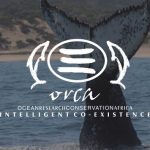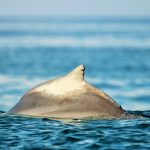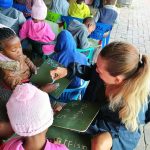March 2016- Research blog
Looking back on March it seems that although Minke may have spent a lot of time in the office working on project proposals the rest of the ORCA team has been busy! During March the ORCA team collected 398 egg cases, though 374 came from Nature’s Valley beach! So after 2 months of running the elasmobranch egg case project a total of 605 egg cases from 6 different species have been collected! This is incredible! We are all very interested to see what is going to happen over winter – will the number of egg cases we have been find drop or stay the same, or will we start finding different species perhaps? Remember that anyone finding egg cases (or seeing live or dead animals) can contribute to the online ELMO database www.elmoafrica.org.
Minke, as the ORCA Foundation researcher, is representing ORCA at the Plettenberg Bay Community Environmental Forum (www.plettenvironmentalforum.co.za). She attended her first meeting in March which began with a very interesting talk by Pikkie Lombard regarding the state of fresh water sources in Plettenberg Bay and surrounds. It is not an encouraging situation. Water is scarce and precious, and we need to do all we can to avoid loss and wastage.
The ORCA team spent some time on the Ocean Blue Adventures whale watching boats, which besides being a lot of fun, is a useful method for collecting data on the dolphins and whales that frequent our beautiful bay. The team takes fin profile photos of as many individuals as possible of all species sighted during the trip and these are added to the collection of photos that ORCA currently has. The aim is to create a catalogue for each species of dolphin and whale which can be used to track individuals through time and space. While it may not seem like it, having a good time and taking lots of photos is a valuable data collection method, as long as the photos do not just sit on a dusty harddrive but are in fact used by either by getting uploaded to one of many citizen science project’s online databases, or added to a growing catalogue. Preferably both! Minke gave the team a lecture on how to process the collected photos, and hopefully this knowledge will be used to process the photos the team is collecting.
We have finally started our own bird ringing program. This month we conducted our pilot bird ringing session at Brackenburn Private Nature Reserve with Brackenburn CREW (www.brackenburncrew.org.za) which although wasn’t a busy morning with regards to catching birds, it was a great morning sitting in the sun and chatting with some really amazing and interesting people! Another site where we conducted bird ringing was at the boardwalk in Plettenberg Bay. The first session was miserably windy which explained our low catch rate, but we were inundated with birds during the second session which was great!
Minke and some of the ORCA team took part in a R statistics course that was organized by Gwen Penry and run by Ian Durbach and Theoni Photopoulou from the University of Cape Town Statistical Sciences Department (www.stats.uct.ac.za) – many thanks to you all! The course was very informative and everyone who participated gained valuable knowledge, or a very thorough refresher.
Brackenburn CREW were notified of a dead electrocuted Vervet Monkey near their facility, and once the ORCA team heard about this they got permission to dissect it before the body was disposed of. Although cause of death was already known it was still an interesting and educational activity. Eskom and the Endangered Wildlife Trust (EWT) have formed a partnership to address the electrocution of species through a number of activities. If you know of a powerline that has caused the electrocution of any animal get in touch with EWT to prevent any further electrocutions ([email protected]).
The ORCA team attended a fynbos workshop facilitated by Nature’s Valley Trust (NVT: www.naturesvalleytrust.co.za). Fynbos is an extremely vast floral kingdom, one of only six in fact, and is endemic to the Cape region. With so much to share, and only a small amount of time to share it in the two lectures were jam-packed with interesting information about the local fynbos. We also had a chance to get hands on using a dichotomous identification key and fynbos field guide to identify a few local species before taking a short but delightful walk through the fynbos learning a little about a variety of species! It was a great opportunity for the team to learn a little more about the place they call home for the duration of their stay.
Great times have been had, and we have some great times planned ahead!
Written by Minke Witteveen, ORCA Foundation Researcher
![Research Blog- March 2016 9 March_About_to_dissect_the_electrocuted_Vervet_Monkey[1]](https://orcafoundation.com/wp-content/uploads/2016/04/March_About_to_dissect_the_electrocuted_Vervet_Monkey1-630x354.jpg)
March About to dissect the electrocuted Vervet Monkey
![Research Blog- March 2016 10 March_Learning_a_lot_on_the_fynbos_workshop[1]](https://orcafoundation.com/wp-content/uploads/2016/04/March_Learning_a_lot_on_the_fynbos_workshop1-630x354.jpg)
March Learning a lot on the fynbos workshop….
![Research Blog- March 2016 11 March_Our_first_bird_caught![1]](https://orcafoundation.com/wp-content/uploads/2016/04/March_Our_first_bird_caught1-630x354.jpg)
March Our first bird caught!
![Research Blog- March 2016 12 March_Ready_for_the_boat_trip[1]](https://orcafoundation.com/wp-content/uploads/2016/04/March_Ready_for_the_boat_trip1-630x354.jpg)
March Ready for the boat trip..jpg


